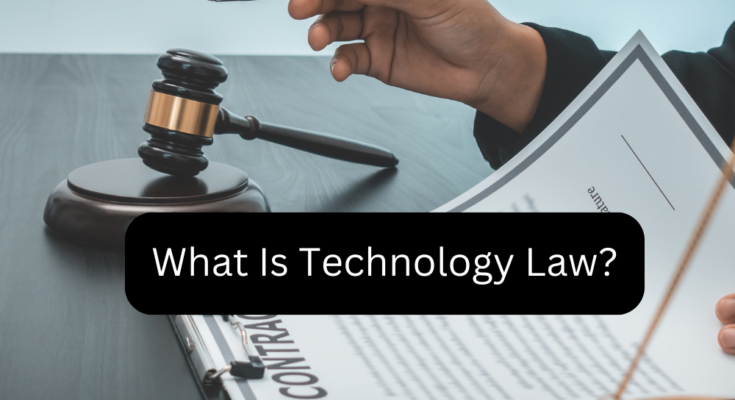Have you ever thought about how your information stays safe on the internet? Well, it remains safe because of technology law. So, what is technology law?
So, technology law is the judge of the internet. It includes a bunch of rules and regulations that oversee everything. Mostly it covers privacy and data protection and e-commerce.
Due to technology law, you can shop online with confidence. You can enjoy the benefits of new technologies without any risks.
Tech lawyers help all kinds of tech companies, from small startups to big global ones. It applies to areas like finance, health, and cryptocurrency. They ensure these businesses do well while also keeping customers and their data safe.
So, want to know more about technology law? Then this blog is for you. In this blog, I will explore the core concepts of it. I will also discuss the key laws and regulations here, and why a law firm needs case management. So, let’s start the discussion with the core concepts of technology law.
Core Concepts of Technology Law
Technology law is a vast concept that deals with many legal factors. You can categorize this vast concept into seven core concepts.
Let’s explore the core concepts of technology law together.
1. Privacy and Data Protection
Technology law sets guidelines on how personal information is collected and used. The aim is to protect your private information and ensure you have control over it.
2. Intellectual Property
This part of the law protects things people create with their minds, like inventions, art, or brand names. It gives creators exclusive rights to their work, encouraging more innovation and creativity.
3. E-Commerce
With online shopping becoming common, technology law regulates how things are bought and sold online. It looks out for fair practices, secure transactions, and protects consumers when they shop on the internet.
4. Cyber-crime
Cybercrime nowadays has increased a lot as people use technology all the time. Technology law deals with cyber crimes like hacking and online fraud. It creates rules to stop these crimes and punish those who commit them.
5. Online Liability
Regarding websites or social media, technology law decides who is responsible for what happens online. It sets the rules to hold online platforms accountable for what users do while still allowing freedom of expression.
6. Digital Rights Management

Technology law controls and protects digital content. It includes music, movies, or software. This law uses Digital Rights Management to balance the rights of creators and consumers.
7. Telecommunications and Information Technology
Technology law software regulates things like phones, internet services, and other tech products. It ensures fair competition and oversees the development of technology. This law makes sure services like wireless and broadband are provided fairly.
Where Does Technology Law Come From?
Federal, state, and global regulations influence technology law in the United States. While a big chunk comes from U.S. federal laws, state rules, and international agreements also shape these laws. Unlike some other laws, it covers many different legal areas.
This field is always changing because technology keeps growing. The laws cover things like online security, copyrights, and privacy, and they can be about doing something wrong (criminal) or resolving disputes (civil).
Making sure people follow these laws is hard for both cops and businesses. As tech moves forward, the rules must be kept up to protect everyone’s rights and keep things fair. It stays on top of new problems and makes sure the laws still work properly.
Importance of Technology Law
We need to know technology laws to handle the legal stuff. These laws protect the rights of tech creators and keep us safe from cyber threats. So, let’s learn the importance of technology law.
Better Security
Technology law plays an important role in providing security. It establishes regulations to protect against cyber threats, data breaches, and other security risks.
These laws set standards for securing information and technology systems. For responding to security incidents, it offers a framework. It protects people and businesses from any potential harm.
Enhanced Privacy
Technology law preserves privacy rights. It keeps your information safe by following privacy rules. Here, technology laws provide guidelines for properly collecting, using and storing personal information.
Increased Online Safety
Technology laws also play a vital role in enhancing online safety by regulating technology usage. These laws save you from various online threats. Here, threats mean cyberbullying, hate speech, and online exploitation.
Moreover, technology law addresses broader issues such as technology addiction. It also ensures that the online environment remains a safe and responsible space for people to interact.

Read: Discovering The IoT Trends You Should Pay Attention
Key Laws and Regulations in Technology
A set of crucial laws and regulations plays an important role in technology. You must know all these key laws and regulations to deal with technology.
So, let’s explore these key laws and regulations in technology together.
1. Children’s Online Privacy Protection Act (COPPA)
COPPA is a national statute designed to save the personal data of children under 13. Websites and online services must obtain parental authorization.
This is a prerequisite before collecting any personal information from young users. For, our younger generation, this law offers privacy for better online experiences.
2. Electronic Communications Privacy Act (ECPA)
The ECPA stands as a federal guardian. It oversees the interception and disclosure of electronic communications. These laws keep your emails and messages safe, working best for your privacy.
3. General Data Protection Regulation (GDPR)
GDPR is a European Union rule about how personal data is collected and used. It goes beyond one country’s borders.
This law applies to all organizations handling personal data. Here, the location doesn’t matter. GDPR sets the standard for responsible data practices.
Why Need Case Management for A Law Firm?
Case Management is important for a law firm. It keeps everything organized and helps you handle legal cases smoothly.
If you use it, there is no chance of missing any deadlines or losing any papers. It brings order to your chaos, making sure all your legal tasks are in one secure digital place.
Whether you’re a big firm or a smaller one, using legal software helps you to stay organized. It keeps you one step ahead, impresses clients with quick services, and keeps all your data safe online.
This software helps your team work together better, motivates everyone, and lets you do your legal thing from anywhere. It is very easy to use and runs your law firm properly. That is why, you need case management for your law firm.
Wrapping Up
Finally, it is essential to know about technology law, especially for dealing with online issues. It ensures your privacy, and data by protecting them. Remember, technology law sets the rules, letting us shop online safely and enjoy new tech without worries.
Understanding the basics of technology law is also important. It includes privacy rules and intellectual property rights. Tech lawyers ensure businesses succeed while keeping us safe online using these laws.
Tech law concerns better security, more privacy, and a safer online space. Knowing laws like COPPA, ECPA, and GDPR is key to being responsible with data.
Another thing that you should know is how to use case management software. It keeps things organized and ensures you don’t miss deadlines or lose any documents. This software makes your legal tasks run smoothly. For a better and safer future, we all should learn about technology law.




